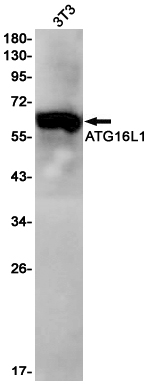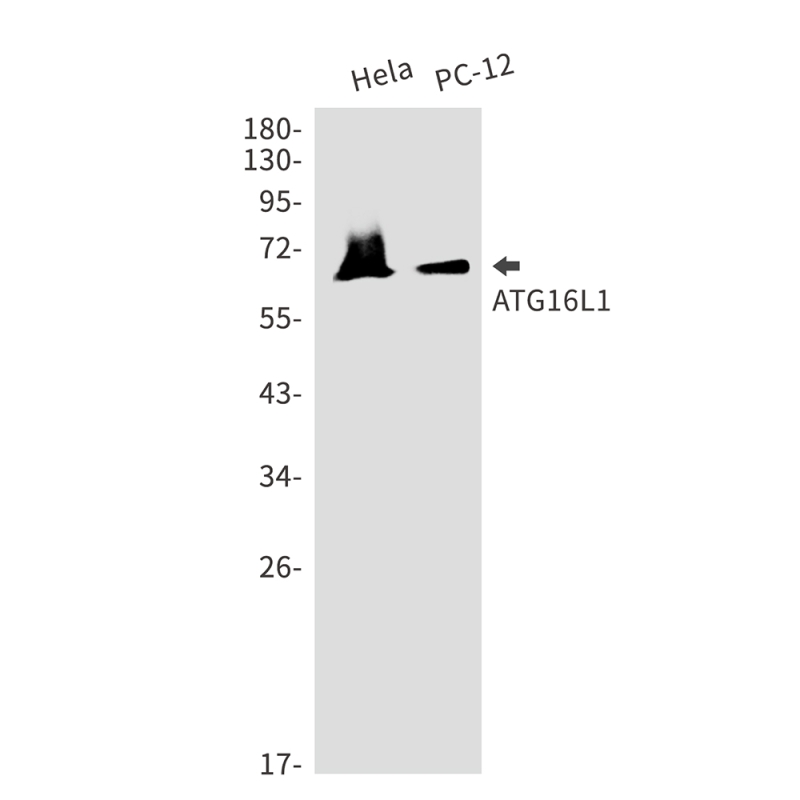

| WB | 咨询技术 | Human,Mouse,Rat |
| IF | 咨询技术 | Human,Mouse,Rat |
| IHC | 咨询技术 | Human,Mouse,Rat |
| ICC | 技术咨询 | Human,Mouse,Rat |
| FCM | 咨询技术 | Human,Mouse,Rat |
| Elisa | 咨询技术 | Human,Mouse,Rat |
| Aliases | ATG16L1; APG16L; Autophagy-related protein 16-1; APG16-like 1 |
| Entrez GeneID | 55054 |
| WB Predicted band size | Calculated MW: 68 kDa; Observed MW: 68 kDa |
| Host/Isotype | Rabbit IgG |
| Antibody Type | Primary antibody |
| Storage | Store at 4°C short term. Aliquot and store at -20°C long term. Avoid freeze/thaw cycles. |
| Species Reactivity | Human,Mouse,Rat |
| Immunogen | Recombinant protein of human ATG16L1 |
| Formulation | Purified antibody in TBS with 0.05% sodium azide,0.05%BSA and 50% glycerol. |
+ +
以下是关于ATG16L1抗体的3篇参考文献及其摘要概括:
---
1. **文献名称**:*ATG16L1 and Crohn's Disease: How Autophagy Regulates Intestinal Immunity*
**作者**:Cadwell, K. et al.
**摘要**:该研究探讨了ATG16L1基因突变与克罗恩病发病机制的关系,利用ATG16L1抗体检测自噬相关蛋白的表达水平,揭示了自噬缺陷导致肠道上皮细胞抗菌功能异常及炎症反应加剧的机制。
---
2. **文献名称**:*Antibody-based detection of ATG16L1 reveals its role in autophagy and Paneth cell function*
**作者**:Sorbara, M.T. et al.
**摘要**:通过ATG16L1特异性抗体进行免疫荧光和Western blot分析,研究发现ATG16L1在自噬体形成和潘氏细胞颗粒分泌中起关键作用,其功能异常与肠道菌群失调及炎症性肠病相关。
---
3. **文献名称**:*ATG16L1 antibody validation for studying autophagy in murine models*
**作者**:Murthy, A. et al.
**摘要**:本文验证了ATG16L1抗体在小鼠模型中的特异性应用,证明其在检测自噬体形成及与溶酶体融合过程中的有效性,为研究自噬相关疾病的分子机制提供了可靠工具。
---
如需具体文献来源(期刊、年份等),建议通过PubMed或Google Scholar搜索标题或作者名获取全文信息。
ATG16L1 is a key protein involved in autophagy, a cellular degradation process essential for maintaining homeostasis and responding to stressors. It forms a complex with ATG5 and ATG12. mediating the conjugation of LC3 (microtubule-associated protein 1A/1B-light chain 3) to phosphatidylethanolamine during autophagosome formation. This step is critical for expanding the autophagosomal membrane and engulfing cellular cargo.
ATG16L1 has garnered significant attention due to its association with inflammatory diseases, particularly Crohn’s disease. Genome-wide studies identified a single-nucleotide polymorphism (SNP) in the ATG16L1 gene (T300A) as a risk factor for Crohn’s, linking defective autophagy to intestinal inflammation. Researchers use ATG16L1 antibodies to study its expression, localization, and interactions in tissues or cultured cells, often via techniques like Western blotting, immunofluorescence, or immunohistochemistry. These antibodies help elucidate how ATG16L1 dysfunction impacts autophagy, immune responses (e.g., Paneth cell abnormalities), and pathogen clearance.
Additionally, ATG16L1 antibodies are tools for exploring tissue-specific autophagy roles and validating gene-editing models (e.g., CRISPR knockouts). Their specificity and reliability are vital for distinguishing ATG16L1 isoforms or phosphorylation states. Ongoing research focuses on how ATG16L1 variants or post-translational modifications influence disease mechanisms, highlighting its therapeutic potential in autophagy-related disorders.
×